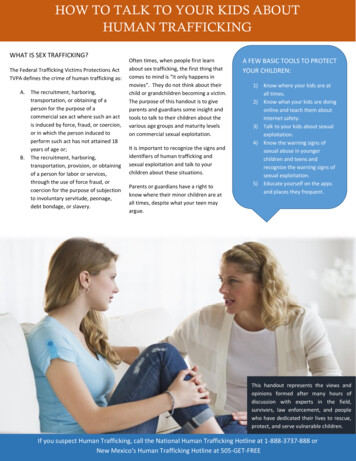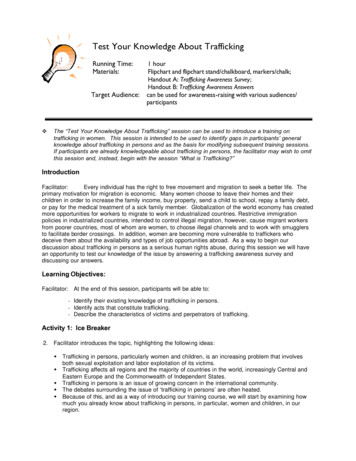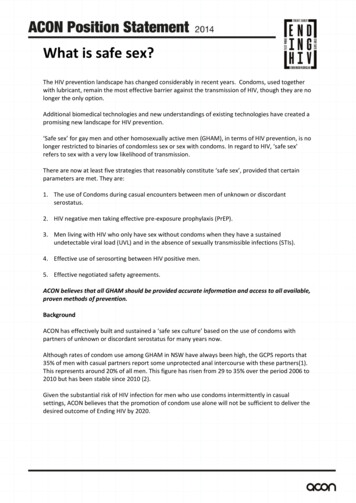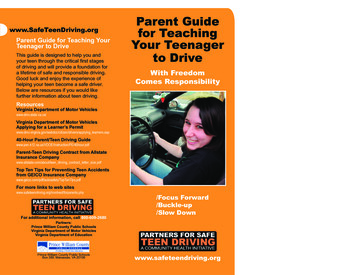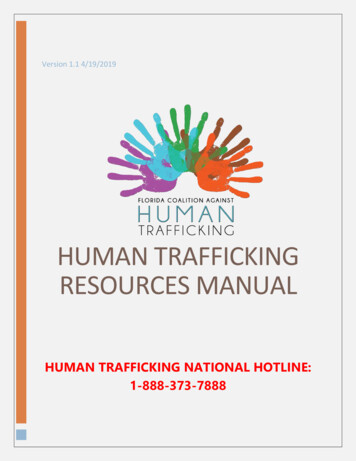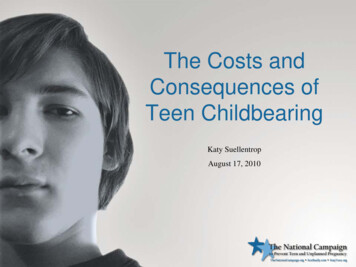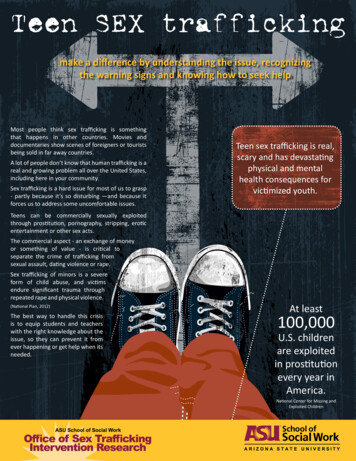
Transcription
Teen SEX traffickingmake a difference by understanding the issue, recognizingthe warning signs and knowing how to seek helpMost people think sex trafficking is somethingthat happens in other countries. Movies anddocumentaries show scenes of foreigners or touristsbeing sold in far away countries.A lot of people don’t know that human trafficking is areal and growing problem all over the United States,including here in your community.Sex trafficking is a hard issue for most of us to grasp- partly because it’s so disturbing —and because itforces us to address some uncomfortable issues.Teen sex trafficking is real,scary and has devastatingphysical and mentalhealth consequences forvictimized youth.Teens can be commercially sexually exploitedthrough prostitution, pornography, stripping, eroticentertainment or other sex acts.The commercial aspect - an exchange of moneyor something of value - is critical toseparate the crime of trafficking fromsexual assault, dating violence or rape.Sex trafficking of minors is a severeform of child abuse, and victimsendure significant trauma throughrepeated rape and physical violence.(National Plan, 2012)The best way to handle this crisisis to equip students and teacherswith the right knowledge about theissue, so they can prevent it fromever happening or get help when itsneeded.At least100,000U.S. childrenare exploitedin prostitutionevery year inAmerica.National Center for Missing andExploited Children
WHAT IS SEX TRAFFICKING?Under federal law, the crime of human trafficking is definedas the recruitment, harboring, transportation, provision orobtaining of a person for the purpose of a commercial sexact where such an act is induced by force, fraud or coercion,or in which the person induced to perform such act has notattained 18 years of age.TARGETEDWHAT DOESTHAT MEAN?trading sex acts for anythingof value is sex trafficking- food- money- drugs- alcohol- gifts- rentthis includes any type ofsex act and stripping, orentertainmentTRICKED Pimps invest alot of time and effort in forming abond with their victim. They buy girlsgifts, provide a place to stay and giveaffection before revealing their trueintent- to sexually exploit them.TRAUMATIZED- place to stayother types of eroticPimps “shop”for their victims online, in shoppingmalls, bus stops, schools, after schoolprograms, foster homes, parks,restaurants and other places whereteens gather.The pimp’s use of psychologicalmanipulation, physical violence andrape can make the victim feel trappedand powerless.(National Center for Missing and Exploited Children)Vulnerable girls can be luredinto prostitution and otherforms of sexual exploitationusing promises, psychologicalmanipulations, provision ofdrugs and alcohol, and violenceor threats of violence againstfamily and friends.If you suspect humantrafficking, call the NationalHuman Trafficking Hotline1-888-3737-888Thirteen yearsold is the averageage a child is firstexploited throughprostitution.HUMANTRAFFICKING INTHE U.S. IS A 9.8 BILLIONINDUSTRYInternational Labor OrganizationThe bad guys areselling underagegirls because itis an easy wayto make a lot ofmoney.
Pimpsare predatorsPimps are predators and referred to as traffickers, as theycommit the crime of human trafficking.A pimp is someone who forces another person intoprostitution, and then keeps some or all of their earnings.A pimp makes arrangements for customers to have sex withtheir victim.Pimps often tattoo or “brand” their victims to show that theyare property, much like a rancher might brand their cattle.Pimps sometimes sell or trade their victims to other pimps.Pimps can look like an ordinary guy or girl. Pimps may be nontraditional, like a family member who pimps out their childfor drugs or rent money. Yes, pimps can be girls, too and oftentimes couples work together to recruit young girls.PIMPS SPEND A LOT OFTIME LOOKING FOR ANDGROOMING THEIR VICTIMS. PIMPS OFTEN PRETEND TOBE AN “OLDER BOYFRIEND,”AND PROMISE FAME,EXCITEMENT, TRAVELAND LOVE.If you suspect human trafficking, call the NationalHuman Trafficking Hotline 1-888-3737-888Up to 90% of minor victims are under thecontrol of a pimp. (Shared Hope, 2014)
When does it happen?Girls (and boys) can be recruited “into the life” during school, after school, while online,on the weekends, in the morning before school basicallyanytimeWhere doesit happen?Pimps shop for their victims online, at shopping malls,bus stops, at school, at after school functions, fosterhomes basically anywhere teens hang out.Traffipred ckers amas ators a ndrtdec erful a eetgain ption atrus ing a te ndtebefo online n’sin p re mee first,ersotingn.How doesit happen?The trafficker willusepsychological manipulation,physical violenceand rape to makethe victim feel trapped and powerless.The pimp may also threaten to harm the victim’sfamily or close friends, as a way to maintain control.The pimp may take modeling “photos” and suggestivevideos and use them to advertise the victim for sexualservices online.If you suspect human trafficking, call the NationalHuman Trafficking Hotline 1-888-3737-888Did you know?In 2013, multiple cases of human trafficking were reportedin all 50 states and Washington, DC (Polaris Project).Between 244,000 and 325,000 American teens are considered“at risk” for sexual exploitation, and an estimated 199,000incidents of sexual exploitation of minors occur each year in theUS. (Estes and Weiner, 2001).
Role of Social Mediain Sex TraffickingPimps seek their next victimthrough social media in places like Facebook, Twitter, Instagram, online gaming chatrooms -always looking forsomeone who is having trouble at home, or with friends.Pimps seek vulnerable girlswho are looking for someoneto “care” for them. Never use your full namewhen creating an ID. Never give your phonenumber to an older guyyou meet at the mall orsome other place whereyou like to hang out. Never post nude or racyphotos online or sharethem via snap chat oremail. Also know thatwhat you say or doon FaceTime could berecorded. Never disclose your address or telephone number or other personalinformation like yourbirthdate. Never post questionablephotos or videos onYoutube, Vine, Facebook,Twitter, Instagram or other popular sites. Never post a status such as “just ran awayfrom home” or “I hate my parents” or “Iwish I could get out of here” or “I hateschool.” Never allow someone you do not knowwell to be your “friend” or “follow” youon Facebook, Twitter, Instagram, or otherpopular sites. Only allow people you reallyknow and trust as “friends” or followers. Never fall for the lie that a photo or videocan eventually be deleted. Once its online,its forever.If you suspect human trafficking, call the NationalHuman Trafficking Hotline 1-888-3737-888REMEMBER:HE MAY NOTREALLY BEWHO HESAYS HE ISAlways turn “locationservices” off on your cellphone, so your whereabouts are not easilytracked.
WHAT MAKES TEENS VULNERABLE?History of child abuseFoster care/group homeJuvenile justice systemAccording to national statistics, a majority Youth in foster care move around a lot, involvementof underage trafficking victims have a history of sexual abuse from earlier in theirchildhood.and are prone to victimization becausethey may not have someone looking forthem or making sure they are safe. Theymay crave the attention a pimp can provide. The pimp/trafficker will provide afalse sense of safety and security and willquickly establish himself/herself as a person that is essential to the victim’s abilityto survive.(National Report on DMST, 2009)Runaways/ Being “thrown out”of the house.Traffickers target teens who are havingtrouble at home. Runaway youth are atan increased risk for predators becausethey have few resources. It is common forteens who have run away to trade sex forbasic survival needs like food, clothes, ora place to stay.While some teens run away from homewithout permission, others are “thrownout” or told to leave by their parents orguardians. Youth who have recently lefthome are most vulnerable within the first48 hours.Youth who have been arrested or are currently on probation are at a higher risk fortrafficking. Juveniles are most commonlyarrested for related crimes such as loitering, curfew, runaway or minor in possession of drugs or alcohol.Gang membershipIncreasingly, gangs are moving to prostitution as a means for income, much likeselling drugs or guns. While drugs or gunscan be sold just once, a human body canbe sold over and over. Some girls are toldthey must sell their bodies as part of ganginitiation, membership or for protection.1.68Over 1.68 millionAmerican children runaway each year.million(National Incidence Studies ofMissing, Abducted, Runaway, andThrownaway Children, 2002)If you suspect human trafficking, call the NationalHuman Trafficking Hotline 1-888-3737-888
What can boys do? Take care ofthe girls in theirlife - sisters,friends, cousins,neighbors! Don’t glamorize“pimping” or theword “pimp”. Be respectful of girls! Don’t buy sex or pay forstripping or porn!IF YOU SEE SOMETHING, ALERT THEPROPER AUTHORITIESWays toprotectyourselffrombecoming avictim:Develop good socialmedia habitsMaintain yourfriendships and be atrue friendDon’t trust people youmeet onlineStay in schoolWork to keep good relationships with your familyDon’t get hooked on drugs or alcoholDon’t runaway from homeDon’t trade sexual favors for money or something of valueDon’t accept expensive gifts from a strangerSeek help if you are feeling depressed or angryThere have been multiple reports of sex trafficking incidenceshappening to students who attend high school.Why don't victims identifyas victims? Why don'tvictims get help or go tothe police?Victims often feel shame, self-blame and feeling of unworthiness of a better life. Victims mayhave formed a trauma bond with their trafficker are unable to see themselves as victimized.Although it’s hard to believe, a victim may havedeep feelings of loyalty and “love” for theirabuser.Sometimes victims do not come forward forhelp because they fear for their own safety orthe safety of their loved ones.Victims may be fearful of law enforcement, ortold by their abuser that they will get arrestedif they say anything, which is not true.If you suspect human trafficking, call the NationalHuman Trafficking Hotline 1-888-3737-888Here are some true stories from a high school like yours:A girl was having a fight with her parents. She left the house and wentto a neighborhood restaurant. While she was crying at a table, a goodlooking guy in his 20’s approached her, was really friendly, offered tobuy her dinner and then suggested she stay at his place for just onenight to get away from her parents. He drove her 50 miles away to apart of town she had never been to. He took her phone. She didn’tknow how to reach her parents or how to get home. Eventually hetold her she owed him and he began selling her for sex.A girl went shopping at a local mall. A guy offered to buy her an expensive purse if she would agree to have sex with him in his car. Shedid it. He kept buying her nice stuff and took her to get her hair andnails done at an expensive salon. She did it again. She thought he washer boyfriend. Eventually, he started selling her to other clients.A girl’s family was behind on their rent. The landlord told the parentsthat he would “forgive the debt” if their daughter would have sexwith him. She did not want her family to be homeless. She did it. Heasked her to do it again and again and eventually made her do it withhis friends.Trust your instincts. Ifsomething “feels” wrong, itprobably is. If somethingseems too good to be true,it probably is.
Warning signs/ What to look forwith your friends/classmates dating an older guy (he might giveyou the creeps) she’s super secretive about him he buys her lots of expensive presents he made her get a weird tattoo she has lots of unexplained cash she shops for clothes and stuff youknow she cannot afford she has a second cell phone you find hotel room keys in her purse she has cuts and bruises she has a fake ID she has been really depressed,nervous, tense or afraid she misses a lot of school or droppedout of school she runs away a lot and avoids herfamily and friends you never know when she’s tellingthe truth she started drinking or doing drugs you feel like she is brainwashedwww.droppingfbombs.com“A real friend will say what needsto be said, even if you don’t wantto hear it.”Friends need to look out for eachother. If something is wrong, tellyour school counselor, nurse or resource officer. Don’t try to handlethe problem yourself, as you oryour friend could be in real danger.If you see something or hear something, say something. If someone isin immediate danger, call 911For more information, please contact:Authors:Office of Sex Trafficking Intervention Research (STIR)Angelyn Bayless, BA, Director of Communications, STIRPhone (602) 496-0093Dominique Roe-Sepowitz, MSW, PhD, Director, ch/stir
the girls in their life - sisters, friends, cousins, neighbors! Don’t glamorize “pimping” or the word “pimp”. Be respectful of girls! Don’t buy sex or pay for stripping or porn! If you suspect human trafficking, call the National Human Trafficking Hotline 1-888-
